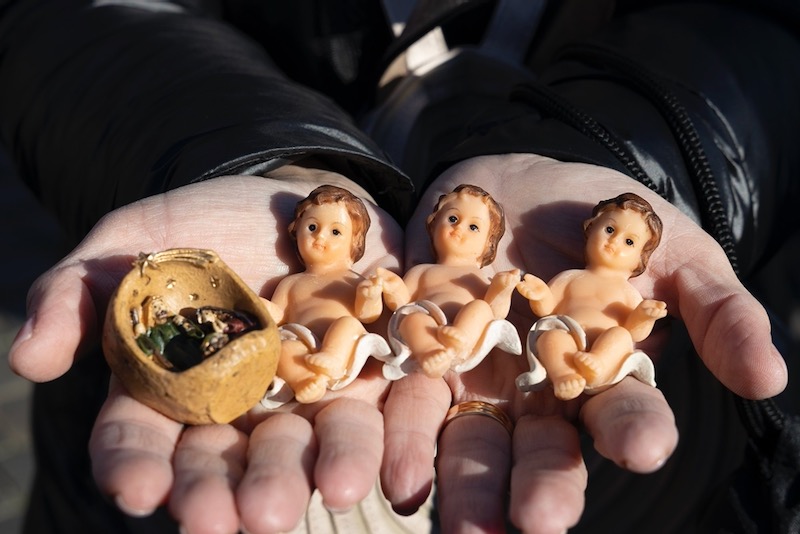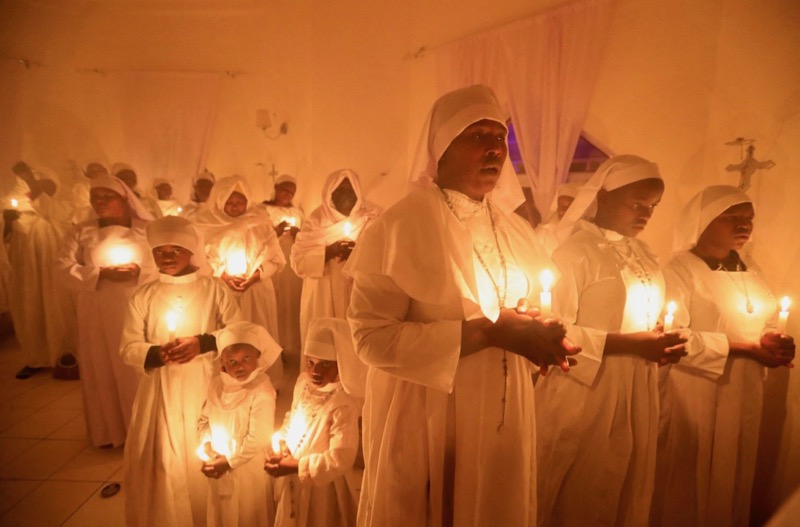You can tell a lot about someone by the way they enter a room, which is why most job interviews are decided long before you’ve said anything. A late friend and colleague, possibly the saintliest person I’ve ever known, so far, used always to come into a room sidewards. He’d slide into a room through the narrowest possible door opening, so as not to draw attention to himself: which his gentle, heart-warming, infectious smile made impossible.
What’s God telling us about himself by the way he entered the world that he himself had created? What do we learn from the fact that the creator and sustainer of this vast, complex, vertigo-inducing universe, slid sideways into his creation at the dead of night, unseen by anybody except his homeless mother and her anxious husband?
What is God telling us about himself by being born as an utterly dependent, closed-eyed, wrinkly, bawling, blue baby into a homeless, refugee, asylum-seeking family, fleeing from almost certain death? God came into his own world as a lost person to find us, who were lost. He came into the world as a stranger, to find us, who were estranged and adrift.
He came into the world that wouldn’t exist without him homeless, to bring us home. And he became as vulnerable as we are, to rescue us in our vulnerability. Indeed, he made himself vulnerable to us: and, when he aroused the ire of this world’s rulers and offended the religious sensibilities of the pious, he allowed himself to be done to death. He shared everything about our human condition, save one thing, to convince us that he is on our side, that he is our friend, not a domineering overlord.
What we see – and it is a startling thought – is God’s humility.
It was with all this in mind that St Francis of Assisi (1182-1226), in his typically dramatic way and only three years before his death, invented the crib. Remembering his trip to the Holy Land, and Bethlehem in particular, he wanted to represent graphically the coming of Christ as our brother and the humility of God, manifest in the Incarnation itself, but also in the poor and deprived conditions of his Son’s birth in this world.
Little wonder that it was the Franciscans in the Middle Ages who side-stepped all the older, feudal ideas about why God became man and died for us, by suggesting that God entered our world for one reason and one reason only, namely, to convince us that he loves us, and to prove it beyond any doubt.
The medieval Dominican mystic, Meister Eckhart (1260-1328), reminded his congregation in a Christmas sermon that the greatest good God ever did for us – apart from creating us – was to become one of us, a fleshly vulnerable, human being, just as we are.
And, in his distinctively homely but disarming way, he told them this story to illustrate the truth at the heart of Christmas.
There was once a rich husband and his rich wife. The wife suffered a misfortune, through which she lost an eye, and she was much distressed by this. Then her husband came to her and said: “Madame, why are you so distressed? You should not distress yourself so, because you have lost an eye.”
Then she said: “Sir, I am not distressing myself about the fact that I have lost my eye; what distresses me is that it seems to me that you will love me less because of it.”
Then he said: “Madame, I do love you”.
Not long after that he gouged out one of his own eyes and came to his wife and said: “Madame, to make you believe that I love you, I have made myself like you: now I too have only one eye.”
Meister Eckhart comments on his story, that this stands for us, who could scarcely believe that God loved us so much, until God gouged out one of his own eyes and took upon himself our human nature. This is what “being made flesh” is. God was prepared to do whatever it took to convince us of his love. That and that alone is what we celebrate at Christmas: God came into the world as one of us, to remove any doubt that we are loved, infinitely and forever.



 Loading ...
Loading ...
What do you think?
You can post as a subscriber user ...
User comments (0)